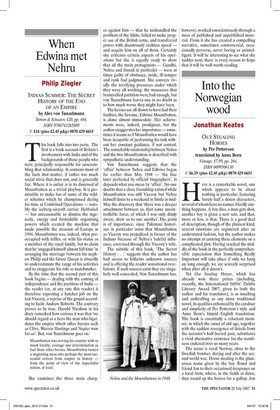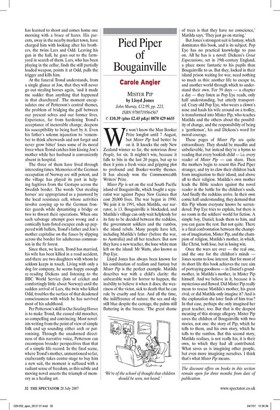Into the Norwegian wood
Jonathan Keates OUT STEALING HORSES by Per Petterson translated by Anne Born Vintage, £7.99, pp. 264, ISBN 0099506130 © £639 (plus £2.45 p&p) 0870 429 6655 Here is a remarkable novel, one which appears to be about nothing in particular, featuring barely half a dozen characters, several of whom have no names. Hardly anything happens. A boy dies, a man gets shot, another boy is given a new suit, and that, more or less, is that. There is a good deal of description, though of the plainest kind, several emotions are registered after an understated fashion, but the author makes no attempt at centring these elements on a complicated plot. Having reached the middle of the book in the perfectly comprehensible expectation that Something Really Important will take place if only we hang on long enough, we are scarcely surprised when after all it doesn't.
Yet Out Stealing Horses, which has already won three prizes (including, recently, the International IMPAC Dublin Literary Award 2007, given to both the author and his translator), is as touching and enthralling as any more traditional novel, its qualities enhanced by the candour and simplicity of Per Petterson's style and Anne Born's limpid English translation. The book is essentially a reluctant memoir, in which the onset of old age, together with the sudden resurgence of details from the narrator's half-buried past, substitutes a vivid alternative existence for the numbness endured over so many years.
The scene is rural Norway, close to the Swedish frontier, during and after the second world war. Horse-stealing is the glamorous name given by the boy Trond and friend Jon to their occasional trespasses on a local farm, where, in the fields at dawn, they round up the horses for a gallop. Jon has learned to shoot and comes home one morning with a brace of hares. His par ents, away in the nearby market town, have charged him with looking after his brothers, the twins Lars and Odd. Leaving his gun in the hall, he goes out to the farmyard in search of them. Lars, who has been playing in the cellar, finds the still partially loaded weapon, points it at Odd, pulls the trigger and kills him.
At the funeral Trond understands, from a single glance at Jon, that they will never go out stealing horses again, 'and it made me sadder than anything that happened in that churchyard'. The moment encapsulates one of Petterson's central themes, the problem of bridging the gulf between our present selves and our former lives. Experience, far from hardening Trond's acceptance of inexorable change, deepens his susceptibility to being hurt by it. Even his father's solemn injunction to 'remember to think afterwards and not forget and never grow bitter' loses some of its moral force when Trond catches him kissing Jon's mother while her husband is conveniently absent in hospital.
The three of them have lived through interesting times. Memories of the German occupation of Norway are still potent, and the village has played its part in helping fugitives from the Gestapo across the Swedish border. The words 'Out stealing horses' are appropriated as a password by the local resistance cell, whose activities involve cosying up to the German frontier guards while dynamiting a bridge or two to thwart their operations. When one such sabotage attempt goes wrong and a comically ham-fisted escapee ends up peppered with bullets, Trond's father and Jon's mother capitalise on the fiasco by slipping across the border for adulterous communion in the fir forest.
Since then, we learn, Trond has married, his wife has been killed in a road accident, and there are two daughters with whom he seldom keeps in touch. Living with only a dog for company, he seems happy enough re-reading Dickens and listening to the BBC World Service (lots of cricket and comfortingly little about Norway) until the sudden arrival of Lars, the twin who killed Odd, troubles the surface of that deadened consciousness with which he has survived most of his adulthood.
Per Petterson's skill in Out StealingHorses is to make Trond, the cussed old moocher, so compelling and convincing. Most novelists writing from the point of view of simple folk end up sounding either arch or patronising. Through the unadorned directness of this narrative voice, Petterson can encompass broader perspectives than that of a simple life-record. In the final scene, where Trond's mother, unmentioned so far, exuberantly takes centre-stage to buy him a new suit, the moment is suffused with a radiant sense of freedom, as this subtle and moving novel asserts the triumph of memory as a healing art.









































 Previous page
Previous page